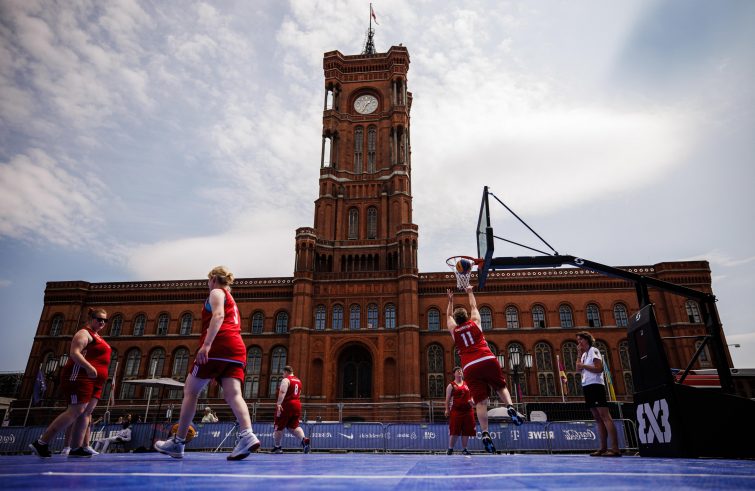
The Special Olympics World Games will come to a close today in Berlin (June 17-23). Athletes from over 190 countries participated in this international event. The mission of Special Olympics (with more than 5.2 million members worldwide) is to provide year-round opportunities for children and adults with intellectual disabilities to participate and compete in a variety of Olympic sports.
Thousands of athletes with mental and multiple disabilities compete in 26 sports.
The Special Olympics World Games is the largest inclusive sports event in the world: the Paralympic Games alone (the next will take place in Paris in 2024) comprise a total of 22 sport disciplines.
The games were broadcast worldwide thanks to a partnership between German public and private television networks and ESPN multimedia sports entertainment company that has retransmission rights in the US, with a total of 220 hours of live coverage in addition to daily highlights.
The Catholic-inspired sports club DJK – Deutsche Jugendkraft (literally ‘German Youth Power’), with its affiliated clubs and diocesan structures, contributes to the organisation of the event by participating in the programme on various levels. Although its designation may sound somewhat bizarre, it recalls a popular 19th century saying that identified all the positive, powerful and creative qualities of young people, not confined to the early stages of life.
At the World Games in Berlin, DJK played an active role by welcoming the athletes and cheering loudly for them. It forms part of the ‘Fans in the Stands’ initiative launched by Special Olympics to make the competitions all the more cheerful and colourful,
including so-called minor sports, that in fact often see considerable participation by persons with neuro-motor disorders and intellectual disabilities. “Fans in the Stands” envisages the presence of people associated with an organization that supports accompanying persons and fans, from small or distant nations or without funds, on their competitive and life journey in Berlin.
Obviously, the project makes no distinction between the athletes, as they have all received the cheers and applause of their supporters: regardless of which country or continent they come from. The celebrations were organised together with cheerful and colourful groups of fans at all competitions.
The official page of the Special Olympics World Game Berlin 2023, well explains what the DJK has relaunched, particularly with its ‘Youth’ section:
“Not all athletes may have supporters that can come to Germany to stand behind them in person. And that’s where you come in. With a loud crowd cheering in the stands, it all feels better. Help our athletes compete at their best and make them feel welcome in Berlin!”.
The extensive DJK organisation closely followed the instructions of the Special Olympics, by coordinating ‘teams’ of ten students or registered members – in German Catholic schools and related sports associations -. The youths thus signalled the athlete or nation they followed and in which competition. Local and diocesan DJK member groups also contributed by creating teams of supporters who signed up to make the Special Olympics World Game in Berlin a success story of sport and all-round inclusion. Each team of fans pampered the chosen athletes in their own way, with musical and colourful initiatives, as well as with festive, welcoming and logistical support: their participation in the competitions was both free and onerous, with the purchase of tickets, so as to ensure full and loud cheering stands.
DJK’s role during the Berlin days was not limited to the stands. In fact, the DJK was involved in the spiritual and recreational activities at the Berlin Exhibition Centre. These were coordinated by Elisabeth Keilmann, the Olympic and Paralympic Sports Assistant of the German Bishops’ Conference, and Christian Bode, the Paralympic Minister of the Protestant Church in Germany.
“We have been preparing for this event for months, with the support of a team from Berlin consisting of representatives of the DJK sports association, the Archdiocese of Berlin, the Ecumenical Council of Berlin-Brandenburg and the Evangelical Church of Berlin-Brandenburg-Silesian Upper Lusatia,” said Christian Bode: “I have accompanied athletes to the Paralympic Games on several occasions and was looking forward to my first Special Olympics as a pastor. I would like to continue this cooperation after the Berlin Games.”
The team, which includes many DJK members who are already involved as supporters, is part of the Special Olympics Germany Organising Committee’s Wellness Team, which is available 24 hours a day to athletes, members of all delegations, relatives, employees, volunteers and sports officials. “We devoted a lot of time to listening and providing opportunities for confidence-building conversations as well as help in everyday situations,” says Elisabeth Keilmann. A dedicated emergency helpline has also been set up.”
Ecumenical events and opportunities for spiritual exchange with church members were held at a stand specifically set up to accommodate athletes with severe disabilities.
“The Games can also help tear down barriers in people’s minds and structures, and to treat people with tolerance, honesty, openness and mutual respect,” said Elisabeth Keilmann, “because we have to approach people openly and wholeheartedly, regardless of whether they have a disability. As Church representatives, we too have a lot to learn from the athletes and on inclusiveness. That is why as pastors we are present not only at the Olympic Games, but also at the Special Olympics.”











